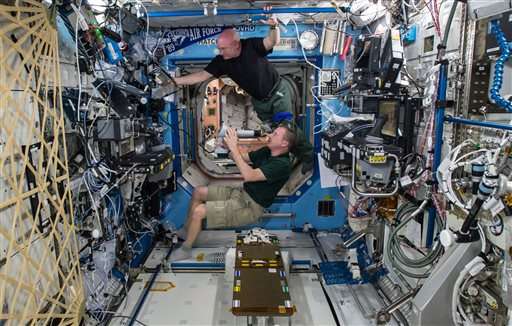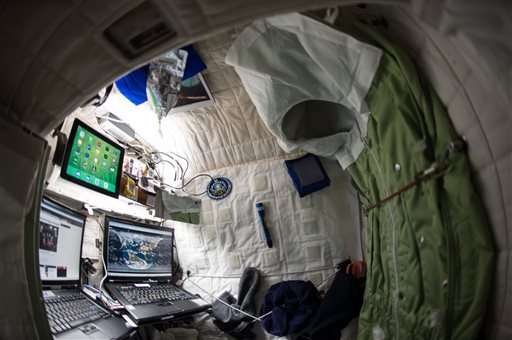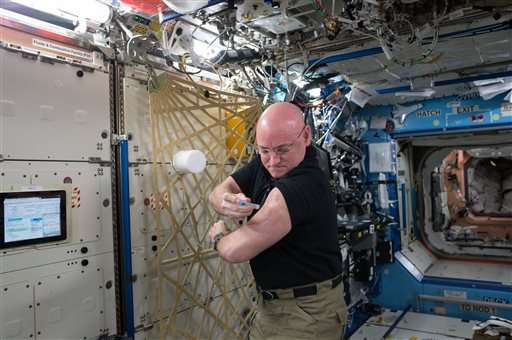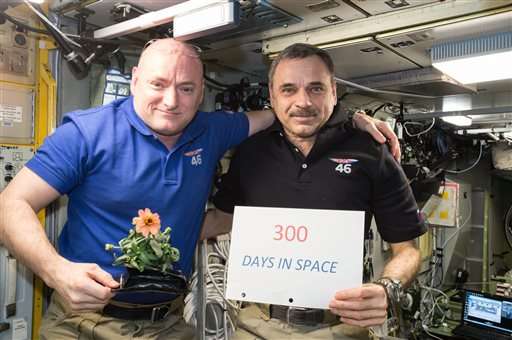One-year spaceman sees mission as 'steppingstone' to Mars

As soon as he returns from the International Space Station, NASA's first and only yearlong spaceman, Scott Kelly, will try to pop up from a lying position and stand still for three minutes.
He'll take a crack at a mini-obstacle course and attempt to walk a straight line, heel to toe—all so researchers can see whether he'd hit the ground running if this were Mars instead of Earth.
NASA considers it crucial prep work for future Mars explorers who will have to spend much longer in space and won't have the help of a welcoming committee. In fact, this mission—which began with a launch last March—is all about Mars.
"I think we'll learn a lot about longer-duration spaceflight and how that will take us to Mars someday," Kelly said Thursday in his final news conference from orbit. "So I'd like to think that this is another of many steppingstones to us landing on Mars sometime in our future."
Kelly's 340-day mission—the longest by 125 days for NASA—comes to a dramatic end Wednesday on the remote steppes of Kazakhstan. (It will be Tuesday night in the U.S.) The astronaut will ride a Soyuz spacecraft back with two Russians, including Mikhail Kornienko, his roommate for the past year.
Once out of the capsule, the two will submit to a multitude of field tests.

What could new arrivals do on Mars, asks Dr. Stevan Gilmore, the lead flight surgeon who will be at the landing site to receive Kelly. Could they jump up and down? Could they open a hatch? Could they do an immediate spacewalk?
The tests on Kelly and Kornienko should provide some answers. There will also be blood draws, heart monitoring and other medical exams. The testing will continue for weeks if not months once they're back home in Houston and at cosmonaut headquarters at Star City, Russia.
Checkups will also continue for Kelly's identical twin, retired astronaut Mark Kelly. The 52-year-old brothers joined forces to provide NASA with a potential gold mine of scientific data: one twin studied for a year in orbit—twice the usual space station stay—while his genetic double underwent similar tests on the ground.
While a handful of Russians have spent longer in space, the record being a 438-day flight, those expeditions date back to the 1980s and 1990s aboard the Mir space station, rustic if not rickety compared with the current space station. Medical testing was spotty back then, and the data weren't always widely shared.
As of Thursday—Day 335—Kelly professed to feeling pretty good. Indeed, flight surgeon Gilmore doesn't expect any alarming results at touchdown.
Kelly's vision has degraded a bit as it did during his last mission, a normal outcome for some astronauts because of increased pressure inside the skull in weightlessness. He anticipates his bones and muscles have weakened as well, despite daily exercise in orbit.

The real question mark—and Kelly's biggest concern—is the possible lingering effects of space radiation.
"Hopefully, I'll never find out what the true effects are of that," Kelly said in a TV interview last week. NASA will need to tackle the problem for Mars trips because of the increased level of exposure.
Johnson Space Center physiologist John Charles puts the psychological side of long-duration spaceflight right up there with radiation, as well as in-flight medical care and even food preservation and packaging for the long haul.
"Just about everything is a big problem for Mars," Charles said in a phone interview.
Mars expeditions planned for the 2030s will last 2½ years; the anticipated crew size will be four to six. The astronauts will almost certainly have to grow some of their own food; that's the reason for an experimental greenhouse aboard the space station.
Kelly and his crewmates grew red romaine lettuce in the mini-hothouse last summer and sampled some of the crop.

Even more impressive, Kelly nursed zinnias back to health in January, displaying a lush orange and yellow floral bouquet on Valentine's Day. He had to "channel my inner Mark Watney"—the lone astronaut played by Matt Damon who survives on potatoes in last year's blockbuster movie "The Martian"—to save the zinnias from mold.
Trust me when to add water, Kelly urged Mission Control, not some preflight script. That's how it will need to be when astronauts venture to Mars, he gently reminded everyone.
Charles stresses that Mars travel will be different than a space station stay. No regular phone chats with the husbands, wives and kids back home. No constant whispering in the astronauts' ears from Mission Control. Support would come via email.
"They're going to be highly autonomous," Charles said of the Mars explorers, "and that's something that we're trying to practice on the space station now ... learning how to get Mission Control out of the back pockets of the astronauts."
Kelly points out that crew quarters on Mars-bound craft will be much tighter than the space station—and nothing like the spaceships of science fiction. Between sleeping and working on his laptop, Kelly estimates he's spent almost half his time inside his personal cubicle—about the size of a phone booth.
NASA will need to improve privacy on Mars missions, he said, if it hopes to combat crew stress and fatigue.
The toughest part for Kelly has been the physical isolation from everyone he loves, 250 miles (400 kilometers) below him. But on a trip to Mars, tens of millions of miles away, astronauts won't be able to even see Earth.
"Obviously going to Mars, there are a lot of other challenges, but none of these we can't overcome," Kelly said.
NASA is discussing doing more one-year flights with the other countries involved in the station program; more subjects are needed for a better understanding of all the challenges. It's a long time, no matter how you cut it. Just ask Kelly, who recently acknowledged, "a year now seems longer than I thought it would be."
© 2016 The Associated Press. All rights reserved.



















